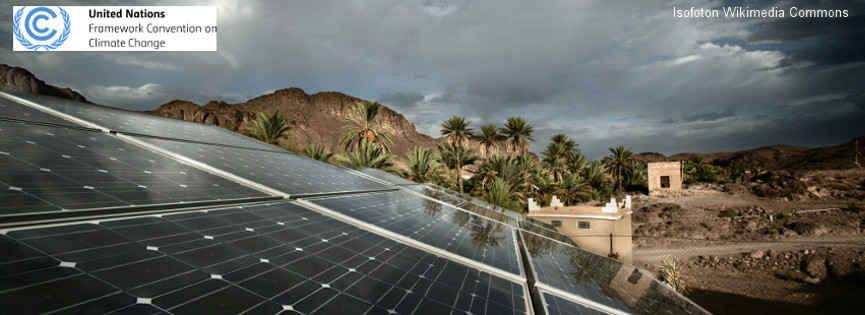You are in:
Laureates
Start of main content
United Nations Framework Convention on Climate Change and the Paris Agreement
Princess of Asturias Award for International Cooperation 2016

The United Nations Framework Convention on Climate Change (UNFCCC) is the UN agreement whose primary goal is to stabilize greenhouse gas emissions in order to “prevent dangerous anthropogenic (human-induced) interference with the climate system”. Within this context, the Paris Summit held at the end of 2015 (known as COP 21), which was chaired by the then Foreign Minister of France, Laurent Fabius, achieved the signing of a historic agreement in the fight against climate change aimed at limiting the increase in the Earth’s temperature. At this summit, the member States reached an historic agreement –which included China and the USA–in terms of its binding and universal character. The fundamental pillars of this agreement establish the need for “holding the increase in global average temperature well below 2°C above pre-industrial levels and pursuing efforts to limit the temperature increase to 1.5°C above pre-industrial levels”, as stated in Article 2, that this measure shall be legally binding for the signatory States, that developed country Parties shall increase the level of financial support, committing to jointly provide funds rising to 100,000 million dollars per year by 2020, and that the agreement is to be reviewed every five years.
The groundwork for the path followed by the United Nations up to the Paris Summit of 2015 lies in the Earth Summit held in Rio de Janeiro (1992), where the United Nations Framework Convention on Climate Change was adopted. This was the first international response to the challenge of climate change, produced via the consensus of a large majority of countries. It established a framework for action aimed at stabilizing the atmospheric concentration of greenhouse gas (GHG) emissions and thus prevent harmful interference with the climate system. Since then, the Parties to the Treaty meet annually at a conference (known as Conference of the Parties or COP) to control and shape the implementation of this response. The first such meeting took place in Berlin in 1995. The Kyoto Protocol (KP) was adopted –by 180 countries– at COP 3, held in Kyoto in 1997. This treaty was a 15-year project considered the first major step towards a global framework for reducing and stabilizing GHG emissions and laid the foundations for future international agreements on climate change. Held in Montreal in 2005, COP 11 marked the entry into force of the Kyoto Protocol –endorsed by 141 signatory States– and provided a framework for the first meeting of the Parties to the KP. COP 15, held in Copenhagen in 2009, was marked by the frustrated expectation that member States would reach an agreement to succeed the 1997 Kyoto Protocol. After this failure, in May 2010 Costa Rican Christiana Figueres was appointed executive secretary of the UNFCCC. This appointment supposed a turning point that eventually led to the success of the 2015 Paris Summit, showing that a common solution to the climate problem could serve as a model to meet the challenges of the 21st century. COP 17, held in Durban in 2011, served to set the tone via the approval to create a Green Climate Fund, which became the main financial instrument of the UN in the fight against climate change, promoting economic development and reducing poverty. Since then efforts have focussed on reaching a solid global agreement, which was achieved in Paris in December 2015 at COP 21. In mid-July 2016, Mexican diplomat Patricia Espinosa replaced Christiana Figueres.
Of the 195 countries that approved the COP Agreement in Paris, 171 signed the document on 22nd April, marking the beginning of the process of ratification and its entry into force. The efforts of Figueres and Fabius to achieve this agreement earned them the recognition of the Ewald von Kleist Award for International Peace and Conflict Resolution in 2016.
End of main content
Sección de utilidades
Fin de la sección de utilidades
- Legal document Legal document (Access key 8)
- | Privacy policy Privacy policy (Access key )
- | Social networks ???en.portal.pie.menu107.title???
- | Cookies ???en.portal.pie.menu110.title???
- | Site map Site Map (Access key 3)
- | Contact Contact (Access key )
- | XHTML 1.0
- | CSS 2.1
- | WAI 'AA
© Copyright 2024. FUNDACIÓN PRINCESA DE ASTURIAS
 WATCH interactivE
WATCH interactivE


